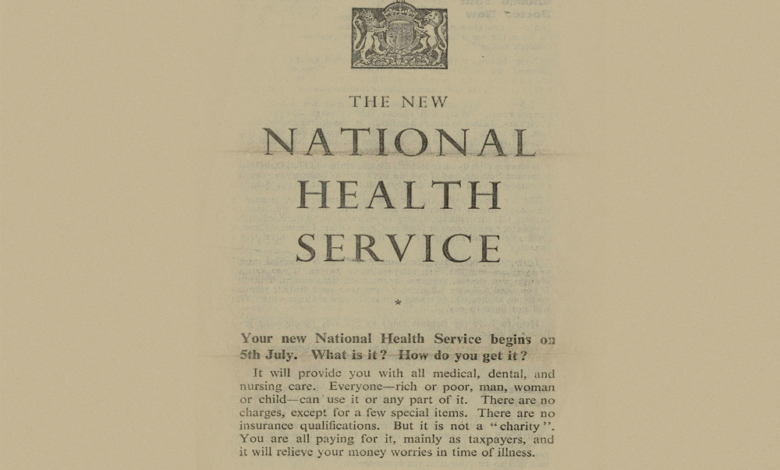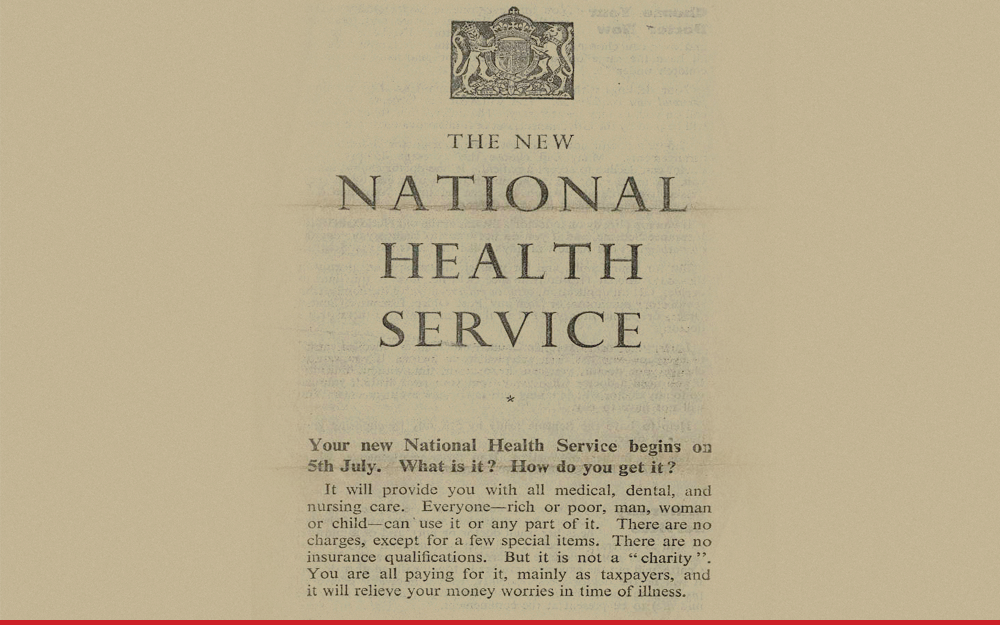
Should Britons Health Be a National Asset?
Should britons health be considered a national asset – Should Britons’ health be considered a national asset? It’s a question that sparks debate, touching on everything from economic productivity to social equity and the very ethics of resource allocation. This isn’t just about healthcare spending; it’s about the fundamental value we place on the well-being of our citizens and the impact that has on the nation as a whole.
We’ll delve into the complex interplay of economic benefits, social implications, and ethical considerations, exploring whether viewing health as a national asset is a worthwhile – and achievable – goal.
The implications are far-reaching. A healthier population translates to a more productive workforce, boosting economic growth and reducing strain on social services. But achieving this requires a significant investment in preventative care, public health infrastructure, and equitable access to healthcare for all, regardless of background or location. We’ll examine the potential costs and benefits, comparing Britain’s current situation to other developed nations, and considering the political and policy hurdles that stand in the way.
Economic Implications of a National Health Asset

Prioritizing national health isn’t just a moral imperative; it’s a powerful economic engine. A healthy population translates directly into a more productive workforce, reduced healthcare costs in the long run, and increased economic growth. This section explores the multifaceted economic benefits of viewing robust public health as a national asset.
Potential Economic Benefits of Prioritizing National Health
Investing in preventative healthcare, improving access to quality care, and promoting healthy lifestyles yields significant economic returns. Early detection and treatment of diseases prevent costly hospitalizations and long-term care needs. Furthermore, a healthy population is more likely to participate fully in the workforce, contributing to economic productivity and innovation. Reduced absenteeism and presenteeism (being at work but not fully productive due to illness) also boost overall economic output.
For example, initiatives promoting workplace wellness programs have been shown to decrease healthcare costs and improve employee productivity in numerous studies. The reduction in lost workdays due to illness alone can generate substantial savings for businesses and the national economy.
Thinking about whether Britons’ health should be a national asset got me pondering priorities. It’s a complex issue, especially when you consider the political maneuvering happening elsewhere; I read this article about John Delaney suggesting some Dems are cheering on a recession to hurt Trump, john delaney suggests some dems are cheering on a recession to hurt trump , which highlights how short-sighted some political strategies can be.
Investing in national health, however, is a long-term strategy with far-reaching benefits, surely a better bet than short-term political gains.
Cost-Benefit Analysis: Healthcare Investment vs. Other National Priorities
While healthcare investment requires significant upfront capital, a cost-benefit analysis reveals substantial long-term returns. Compared to spending on other national priorities, such as defense or infrastructure, investments in preventative care and public health programs often show higher rates of return in terms of improved population health and increased economic activity. For instance, a study might compare the cost of implementing a nationwide vaccination program against the costs associated with treating preventable diseases later.
The reduced burden on hospitals, the prevention of long-term disability, and the increase in workforce participation could all contribute to a positive net economic benefit. This isn’t to diminish the importance of other national priorities, but rather to highlight the significant economic advantages of a healthy population.
Impact of a Healthy Workforce on National Productivity and Economic Growth
A healthy workforce is the backbone of a thriving economy. When individuals are healthy, they are more productive, creative, and innovative. This leads to higher levels of economic output, increased innovation, and overall economic growth. Conversely, a less healthy workforce leads to decreased productivity, higher absenteeism, and increased healthcare costs, ultimately hindering economic progress. Countries with robust healthcare systems and strong public health initiatives often exhibit higher levels of economic productivity and growth compared to those with weaker systems.
This correlation underscores the importance of a healthy workforce as a key driver of national economic prosperity.
Comparison of Healthcare Spending in Britain to Other Developed Nations
| Country | Healthcare Spending per Capita (USD) | % of GDP spent on Healthcare | Life Expectancy (Years) |
|---|---|---|---|
| United Kingdom | 4,500 (approx.) | 10% (approx.) | 81 (approx.) |
| United States | 12,000 (approx.) | 18% (approx.) | 79 (approx.) |
| Canada | 5,500 (approx.) | 11% (approx.) | 82 (approx.) |
| Germany | 6,000 (approx.) | 12% (approx.) | 81 (approx.) |
Note
These figures are approximate and may vary depending on the year and source of data. More precise figures require referencing specific reports from organizations like the OECD or the World Health Organization.*
Social Impact of Viewing Health as a National Asset
Prioritizing national health isn’t just about medical advancements; it’s a fundamental investment in the social fabric of a nation. Viewing health as a national asset profoundly impacts social equity, community well-being, and the overall strength of a society. A healthy population is a productive population, contributing significantly to economic growth and social stability. Conversely, neglecting national health leads to a cascade of negative social consequences that ripple through every aspect of life.Viewing health as a national asset fosters a more equitable society.
By ensuring access to quality healthcare for all citizens, regardless of socioeconomic status, we address long-standing health disparities. This approach actively dismantles systemic barriers that prevent vulnerable populations from receiving the care they need.
Improved Social Equity and Reduced Health Disparities
Prioritizing national health directly addresses health disparities, improving social equity. For example, universal healthcare systems, like those in many Scandinavian countries, have demonstrably reduced health disparities based on income. These systems provide equal access to preventative care, leading to better overall health outcomes for all citizens, regardless of their financial situation. This contrasts sharply with systems where healthcare access is tied to employment or ability to pay, creating significant inequalities.
In such systems, lower-income individuals often delay or forgo necessary care, leading to worse health outcomes and increased social inequality. The resulting cycle of poverty and poor health perpetuates existing social divisions. Investing in public health campaigns targeted at specific vulnerable populations—such as those focused on maternal health, childhood immunizations, or diabetes prevention within specific communities—also helps reduce disparities and improve social equity.
Potential Social Consequences of Neglecting National Health
Neglecting national health has significant social consequences. A population suffering from preventable diseases faces decreased productivity, impacting economic growth and increasing social burdens. The cost of untreated illnesses, both in terms of healthcare expenditures and lost productivity, is far greater than the cost of preventative measures. Furthermore, a lack of access to healthcare can lead to increased social unrest and instability.
When individuals lack access to basic healthcare needs, it can lead to increased stress, anxiety, and social alienation, potentially contributing to higher crime rates and social instability. For example, communities with high rates of untreated mental illness often experience higher rates of crime and violence. The burden of caring for individuals with untreated illnesses often falls disproportionately on families and communities, straining social support systems.
Impact on Social Cohesion and Community Well-being
A robust healthcare system is crucial for social cohesion and community well-being. When people feel secure in the knowledge that they have access to quality healthcare, it fosters trust in the government and institutions. This trust is a cornerstone of social cohesion. Furthermore, a healthy population is more likely to participate actively in community life, contributing to stronger social networks and a sense of belonging.
A strong sense of community well-being is also enhanced by readily available healthcare resources, which facilitate healthier lifestyles and improved overall quality of life. Conversely, a system that fails to provide adequate healthcare leads to increased social fragmentation, distrust in authority, and diminished community spirit.
Positive Social Outcomes of Improved Public Health Initiatives
The positive social outcomes of improved public health initiatives are substantial. Investing in public health translates to a healthier, more productive population.
- Reduced healthcare costs in the long run due to prevention.
- Increased workforce participation and productivity.
- Improved educational attainment due to healthier children.
- Stronger community bonds and social networks.
- Reduced crime rates and improved social safety.
- Increased life expectancy and improved quality of life.
Ethical Considerations of Prioritizing National Health: Should Britons Health Be Considered A National Asset

Prioritizing national health inevitably raises complex ethical questions about resource allocation, individual rights, and the very definition of a “healthy nation.” The inherent tension between individual needs and societal well-being necessitates a careful examination of the ethical frameworks underpinning healthcare policy. This exploration will delve into the ethical implications of resource allocation within a national health system, compare different healthcare delivery models, and analyze the delicate balance between individual autonomy and collective responsibility.Resource Allocation in a National Health System Presents Ethical DilemmasThe finite nature of healthcare resources necessitates difficult choices about who receives what treatment and when.
A national health system prioritizing national health must establish clear and transparent criteria for resource allocation. This involves grappling with questions of fairness, equity, and the potential for discrimination. For example, should resources be allocated based solely on need, or should factors like age, lifestyle choices, or prognosis play a role? These are ethical questions with no easy answers, and different societies will prioritize different values in their decision-making.
The potential for bias in resource allocation, particularly against vulnerable populations, is a serious ethical concern that demands careful consideration and mitigation strategies.
Comparative Analysis of Healthcare Delivery Models and Their Ethical Implications
Different healthcare delivery models present varying ethical challenges. A purely market-based system, for example, can exacerbate health inequalities by favoring those with greater financial resources. This creates an ethical dilemma where access to essential care becomes a privilege rather than a right. Conversely, a completely centralized, state-controlled system might lead to limitations in individual choice and potential inefficiencies due to bureaucratic constraints.
A mixed model, combining elements of both market and state control, attempts to balance these concerns but still faces ethical challenges related to equitable access and the potential for corruption or undue influence. The ethical implications of each model need careful scrutiny to ensure that the system aligns with the nation’s ethical values.
Balancing Individual Rights and Collective Responsibility for National Health
The ethical challenge of prioritizing national health lies in balancing individual rights with collective responsibility. Individual autonomy – the right to make one’s own healthcare decisions – is a cornerstone of many ethical frameworks. However, prioritizing national health often necessitates interventions that might infringe upon individual liberty, such as mandatory vaccinations or public health campaigns that restrict personal freedoms.
Finding a balance requires careful consideration of the potential benefits to the population as a whole, weighed against the potential infringement on individual rights. For instance, mandatory vaccination programs, while beneficial for herd immunity, might clash with individuals’ right to refuse medical treatment. This delicate balance demands robust public discourse and ethically sound policy-making.
Thinking about whether Britons’ health should be a national asset got me pondering scale – the vastness of investment needed! It’s a question that makes you consider truly awe-inspiring scales, like the mysteries explored in this fascinating article: is the deep ocean more magnificent than outer space. The sheer investment in space exploration, for example, dwarfs the current spending on preventative healthcare in the UK; perhaps a re-evaluation of priorities is in order, prioritizing the health of our nation.
Arguments For and Against Prioritizing National Health Based on Ethical Frameworks
Utilitarianism, a consequentialist ethical framework, supports prioritizing national health by focusing on maximizing overall well-being. From this perspective, investing in public health measures that benefit the majority is ethically justifiable, even if it means sacrificing some individual liberties or resources. However, deontological ethics, which emphasizes moral duties and rights, might argue against such prioritization if it leads to the violation of fundamental human rights, regardless of the overall benefit.
Thinking about whether Britons’ health should be a national asset got me pondering the interconnectedness of global issues. A healthy population is a productive one, and environmental factors heavily influence health. This leads me to wonder how global cooperation, or lack thereof, impacts us all; for instance, check out this article on how Donald Trump’s election will affect COP29 climate talks , as climate change undeniably affects public health.
Ultimately, investing in both environmental protection and national health seems like a pretty smart long-term strategy.
For example, mandatory screening programs, while potentially beneficial for early disease detection, could violate individual privacy rights. The debate thus hinges on the relative weighting of different ethical principles and the specific context in which decisions are made. Each ethical framework offers a unique perspective, leading to different conclusions regarding the ethical justification of prioritizing national health.
Political and Policy Ramifications
Prioritizing national health as a strategic asset carries significant political and policy implications, demanding careful consideration of potential challenges and opportunities. The shift requires navigating complex political landscapes, influencing government spending, and addressing differing ideological perspectives on healthcare provision.Implementing policies to elevate national health requires overcoming substantial political hurdles. Existing vested interests within the healthcare system, powerful lobbying groups, and ingrained political ideologies can create resistance to significant reform.
For example, shifting resources away from other government priorities, like defense or infrastructure, to bolster healthcare investment will likely face opposition from those sectors. Furthermore, the complexities of healthcare financing, including balancing public and private contributions, can lead to protracted political debates and compromises that dilute the impact of intended reforms.
Political Challenges to Implementing National Health Prioritization
The path to prioritizing national health faces considerable political opposition. Resistance can stem from various sources: powerful lobbying groups representing specific healthcare providers or pharmaceutical companies may oppose measures that threaten their profits. Political parties with differing ideological stances on healthcare provision may find themselves at odds regarding the best approach. For instance, parties favouring market-based healthcare systems might resist increased public spending, while those advocating for universal healthcare might face challenges in securing sufficient funding.
Finally, the sheer scale of necessary changes and the long-term nature of the investment needed may make it difficult to garner sustained political support, especially in times of economic uncertainty.
Examples of Successful National Health Policies and Their Applicability to Britain
Several countries have successfully implemented national health policies that improved population health outcomes. The Canadian healthcare system, based on universal access to publicly funded healthcare, offers a model of comprehensive coverage. While not without its challenges, Canada’s system demonstrates the potential for achieving widespread access to essential services. Germany’s social health insurance system, a model of mandatory health insurance with both public and private providers, offers another example of a functioning system balancing public and private sector involvement.
Adapting these models to Britain requires careful consideration of the existing NHS infrastructure and the cultural context of British healthcare. Direct transplantation is unlikely to be successful; rather, a hybrid approach drawing on best practices from multiple systems may prove more effective.
Impact on Government Spending and Taxation
Prioritizing national health inevitably impacts government spending and taxation. Increased investment in preventative care, public health initiatives, and improvements to the NHS infrastructure necessitates substantial financial commitment. This could involve raising taxes, redirecting funds from other areas of the budget, or a combination of both. For example, a significant increase in funding for preventative health programs could lead to a reduction in long-term healthcare costs by reducing the incidence of chronic diseases.
However, the initial investment would require a corresponding increase in government revenue, potentially through higher income tax, national insurance contributions, or a dedicated healthcare tax. Accurate cost-benefit analyses are crucial to justify such investments and to demonstrate their long-term economic viability.
Different Political Ideologies and National Health as an Asset, Should britons health be considered a national asset
Different political ideologies approach national health as an asset in fundamentally different ways. Left-leaning parties typically advocate for a strong, publicly funded healthcare system, viewing health as a fundamental human right and prioritizing equitable access to care. They would likely support significant increases in government spending and progressive taxation to achieve this. Right-leaning parties, on the other hand, often emphasize market-based solutions, advocating for greater private sector involvement and competition in healthcare.
They might favour tax cuts and deregulation to stimulate private investment in healthcare, potentially leading to a more fragmented and less equitable system. Centrist parties might seek a middle ground, aiming to improve the efficiency of the existing system while retaining a significant public sector role. The political debate surrounding national health as an asset will therefore reflect these differing ideological positions and their respective approaches to healthcare financing and delivery.
Measuring the Success of a National Health Asset Approach

Defining success when health is treated as a national asset requires a multifaceted approach that goes beyond simple metrics like life expectancy. A robust framework needs to consider the interconnectedness of various health indicators and their impact on the broader societal well-being. This involves not only measuring improvements in health outcomes but also assessing the efficiency and equity of the investments made.A comprehensive framework for measuring the success of policies aimed at treating health as a national asset should incorporate a range of indicators across various dimensions of health and well-being.
This framework would move beyond simple mortality rates and delve into the quality of life, access to care, and the overall societal impact of a healthy population.
Key Performance Indicators (KPIs) for National Health Outcomes
Tracking progress towards improved national health outcomes necessitates a carefully selected set of KPIs. These indicators should be relevant, measurable, achievable, and time-bound. A balanced scorecard approach, encompassing financial, social, and environmental factors, would provide a holistic view of the effectiveness of national health initiatives. For example, simply increasing life expectancy might not be sufficient if that increase is accompanied by a rise in chronic diseases leading to reduced quality of life.
- Life Expectancy at Birth and at Age 65: Provides a baseline measure of overall population health and longevity.
- Healthy Life Expectancy (HALE): Measures the number of years a person can expect to live in “full health” by adjusting for years lived with disability or illness. This offers a more nuanced picture than simple life expectancy.
- Infant and Child Mortality Rates: Reflects the effectiveness of preventative care and access to healthcare for vulnerable populations.
- Prevalence and Incidence of Chronic Diseases: Indicates the success of initiatives aimed at preventing and managing chronic conditions such as heart disease, diabetes, and cancer.
- Self-Reported Health Status: Captures the subjective experience of health, providing valuable insights into population well-being that objective measures might miss.
- Access to Healthcare Services: Measured by factors like waiting times for appointments, geographical accessibility of facilities, and affordability of healthcare.
- Health Disparities: Analyzing health outcomes across different socioeconomic groups, age groups, and geographical locations helps identify and address inequities in access and outcomes.
Data Collection and Analysis for Monitoring National Health Initiatives
Effective monitoring requires a robust data collection and analysis system. This involves establishing a centralized repository for health data, integrating data from various sources (e.g., hospitals, clinics, public health agencies), and employing advanced analytical techniques to identify trends and patterns. Regular audits and independent evaluations are crucial for ensuring the accuracy and reliability of the data.For instance, regular surveys could be conducted to collect data on self-reported health status, healthcare utilization, and satisfaction with healthcare services.
This data can then be analyzed to identify areas for improvement and measure the impact of specific interventions. Administrative data from healthcare providers can be used to track trends in disease prevalence, healthcare utilization, and healthcare costs.
Assessing the Return on Investment (ROI) in National Health Initiatives
Evaluating the ROI of national health initiatives necessitates a comprehensive approach that considers both direct and indirect costs and benefits. Cost-effectiveness analysis, comparing the cost per unit of health outcome achieved by different interventions, is a valuable tool. Further, economic modeling can project the long-term economic benefits of improved population health, such as increased productivity and reduced healthcare expenditure.For example, investing in preventative care programs, such as vaccination campaigns, may result in lower healthcare costs in the long run by preventing costly hospitalizations and treatments.
Similarly, investing in public health initiatives to address social determinants of health (e.g., poverty, education, and housing) can have a significant positive impact on population health and reduce the overall burden on the healthcare system. The ROI can be calculated by comparing the cost of the initiative to the savings in healthcare costs and the increase in productivity and economic output resulting from a healthier population.
This can be expressed as a ratio or percentage, providing a quantifiable measure of the effectiveness of the investment.
Ultimately, the question of whether Britons’ health should be considered a national asset isn’t just a matter of economics or policy; it’s a fundamental question about our values. While the financial implications are substantial, the social and ethical dimensions are equally important. Investing in national health is an investment in a stronger, more equitable, and more prosperous future.
The path forward requires a commitment to long-term planning, strategic investment, and a willingness to confront the complex challenges involved in building a truly healthy nation. It’s a challenge worth embracing.






